If you saw the recent BookNotes post you know that the extraordinary British scholar and world-class Christian leader N.T. Wright is visiting us here at Hearts & Minds on May 12th, 2012. It is a real privilege for us to host him, and hope our small-town shop can survive the visit of such a world-famous author and churchman. We think it is going to be a blast and hope you can come.
 Besides Dr. Wright’s duties, now, as a professor at The University of St. Andrew’s in Scotland (founded, by the way, in the early 1400s!) he writes both scholarly works and popular level books, Bible commentaries, and apologetics helping explain the Christian faith in ways that are fresh, relevant, orthodox, if a tad counter to some tellings of the gospel. We hope you looked at the two brief video interviews we had posted as they hint at how very interesting and urgent his last two books are. Having these two new ones to sell makes us happy as they are faithful and well-written, thoughtfully mature but accessible for most readers, critical of business as usual but not nutty or off-putting. They will help inspire (please, Lord!) a new wave of serious followers of Jesus who want to be winsome and principled, Biblically faithful and eager to make things happen. As booksellers committed to selling books of this very sort, for this very purpose, we are delighted, and look forward to hearing how these books make a difference, or at least prod you to think and act with greater intention for God’s glory and our world’s good.
Besides Dr. Wright’s duties, now, as a professor at The University of St. Andrew’s in Scotland (founded, by the way, in the early 1400s!) he writes both scholarly works and popular level books, Bible commentaries, and apologetics helping explain the Christian faith in ways that are fresh, relevant, orthodox, if a tad counter to some tellings of the gospel. We hope you looked at the two brief video interviews we had posted as they hint at how very interesting and urgent his last two books are. Having these two new ones to sell makes us happy as they are faithful and well-written, thoughtfully mature but accessible for most readers, critical of business as usual but not nutty or off-putting. They will help inspire (please, Lord!) a new wave of serious followers of Jesus who want to be winsome and principled, Biblically faithful and eager to make things happen. As booksellers committed to selling books of this very sort, for this very purpose, we are delighted, and look forward to hearing how these books make a difference, or at least prod you to think and act with greater intention for God’s glory and our world’s good.
(You know, Beth and I and our caring staff are delighted when anybody reads almost anything. Reading is a joy and formative, and even the most basic, routine kinds of books can be rewarding to recommend. (Here’s a short article I had published in The High Calling blog a few days ago.) We’re not snooty about this, and yet, when folks stretch a bit and read truly world-changing stuff—helping them think in creative ways, grow and emerge as re-formed agents for making a difference in the world—well, that makes our day. Selling these kinds of books does that for us.)
We have found Wright’s work over the last two decades or so to be amazingly important, confirming visions and values that we have come to believe from our own varied influences since back in the 1970s. One one hand, this isn’t all that different: many of us were taught to love God and love others, to read the Bible and live right, to care about Jesus and to work for social improvement. Okay, that simple formulation works for a bit, although most of us need deeper shaping (Wright wrote a book on character formation on this very matter) and we need some social criticism, some framework for thinking about the nature of the problems of the world and the contours of Biblically-directed cultural renewal, so serious attention of the sort Wright brings is so helpful. Some, of what inspired us to start the bookstore with the particular vision we had, is reaffirmed in this body of work of Mr. Wright. I can count on one hand, maybe, prolific authors who are so very close to what we had hoped for in the beginning when we started this experiment in bookseller.
Yes, before Wright, we had some heady days. I sometime tells of decisive moments (learning that a man from my church marched with Martin Luther King, joining a small group to resist the ongoing militarism of Southeast Asia, hearing the serious Christian call to cultural engagement from Os Guinness, and reading his first book. There was a Dutch Reformed philosopher (Peter J. Steen) who taught about Dooyeweerd and Kuyper and the influence of the evangelists to European hippies and late-60s cultural critics Francis & Edith Schaeffer. We were mentored from a far by radical social action leaders like Jim Wallis, Tony Campolo, Ron Sider, John Perkins, and others and studied the mature, balanced historic evangelical writers like John Stott and J. I. Packer. On my favorite books is by Richard Foster, called Streams of Living Water (HarperOne; $15.00) which describes the strengths of various important streams within the Christian tradition and how each brings something important to us. That’s one of the reasons our bookstore has been ecumenical from the beginning. We want to learn from the liturgical tradition of the Anglicans and the charismatic tradition of the Pentecostals and so forth.
Through all of this, and our inclination to be at home in fairly ordinary mainline denominational churches we have been cobbled together a vision of faith that is insistent on serious, mostly Reformed theology, a strong emphasis on the Kingdom of God defined as creation redeemed, and a desire to see a robust relationship between liturgy and life, between Sunday and Monday, between faith and cultural renewal. From Marva Dawn to Eugene Peterson, from contemporary writers on the missional church to those who see inner spiritual formation as a foundation for a life of service, we have been shaped by many good writers, old and new, on mainline denominational presses and on evangelical ones. Wright is among them, and his extraordinary insights about the Bible seem to work in a way that ties our various influences all together. Wright has meant a lot to us as booksellers and as readers ourselves. He is important to our journey, and hope you know at least some of his many books.
Lots of this particular vision comes to us from the (now fairly common) insight that Christ stands as the first century Jewish Messiah, the One who continues on the unfolding story of God’s mighty deeds and gracious covenants with Israel, finally getting them out of exile (fulfilling the long-ago promise of rebuilding the destroyed temple by being that temple) and, in keeping with the big, cosmic hopes of Isaiah, renewing not just Jerusalem, but the whole, entire Earth! His atoning death and resurrection is how the new creation is created, and those who are found to grafted in to this grand rescue plant or recreation are His agents of hope and healing in the world. The story of creation and covenant, of Israel and Church, the promise and deliverance, from creation to new creation, this is the story that shapes not only the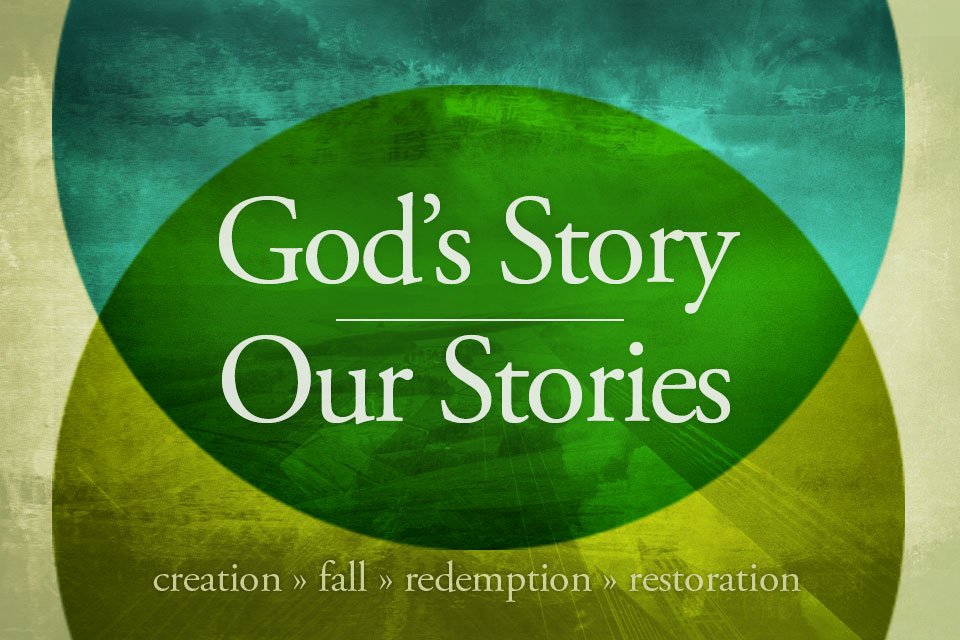 narrative of the Bible but of our own lives, as well. We become part of this story, and Christ becomes our very life. In union with Him, tied, then, to each other, we become what we sometimes call “Kingdom people.” Our community of reconciled folk are the first fruits of the eschatological hope; that is the future blessed hope. Christ inaugurates this rescue plan that is global in scope and could be somewhat understood, at least, in what Martin Luther King called “the beloved community.” Wright says all this so much better than I, but much of it we learned from Al Wolters’ Creation Regained or Howard Snyder’s Community of the King or Richard Mouw or Jacques Ellul or Herman Ridderbos or Samuel Escobar or even John Bright, whose book on the Kingdom of God my pastor gave me back in the early 70s, thinking I’d like it.
narrative of the Bible but of our own lives, as well. We become part of this story, and Christ becomes our very life. In union with Him, tied, then, to each other, we become what we sometimes call “Kingdom people.” Our community of reconciled folk are the first fruits of the eschatological hope; that is the future blessed hope. Christ inaugurates this rescue plan that is global in scope and could be somewhat understood, at least, in what Martin Luther King called “the beloved community.” Wright says all this so much better than I, but much of it we learned from Al Wolters’ Creation Regained or Howard Snyder’s Community of the King or Richard Mouw or Jacques Ellul or Herman Ridderbos or Samuel Escobar or even John Bright, whose book on the Kingdom of God my pastor gave me back in the early 70s, thinking I’d like it.
Such a beloved community is a gift, of course, and we do not “build” the Kingdom or “redeem” anything ourselves, although I suppose our witness includes building signposts pointing the way. All areas of life can be construed — indeed, must be!
–from a Biblically-rooted vantage point and the Kingdom way of life is one which has vast implications as we break with the principles and practices of the North American Way of Life. Our bookstore and my speaking schedule have said these things, one way or another, over and over, sometimes to eyes raised in suspicion, sometimes with great glee. People are hungering for a way to connect the Bible and life, in a way that is neither liberal or literal. Wright brings a better way.
Wright helps us see that we can’t read the Bible as a simple rulebook or manual for Christian living: it is more like a map, or a compass. (But it is at least that; it is God’s explosive Word, not just a interesting story of only metaphor and image.) We make sense of this map as we start going in the direction it points, we “get it” more and more—huge hat tip to James K.A. Smith, here—when we have thick and transformative liturgies and rituals that help us desire the Kingdom, embodying it naturally in our daily discipleship, often counter-culturally, against the world. Such enactment of the Bible story shapes our desires, and gives us what Brueggemann calls “the prophetic imagination.”

I don’t know if Wright says all this in any one place, but it is my summary of his importance: rightly reading the Word enables us to rightly live the Word in the world. Wright talks about the Bible being the script of a play that is yet to be finished, inviting us to indwell that plotline and improvise as we finish the story until the last grand act, of which we are sure.
And, happily, we know the One who built the stage, the One who is the playwright, and as an improvising troupe, are infused with the Spirit of the Star of the show. In Christ, we become the actors in the unfinished drama, getting in on the action, being Biblically-inspired creators of the next act in this Divine Drama of cosmic redemption. He has said this often, and explains it well, how we must steep ourselves in the character and plot of the story, and dare not improvise in a way that isn’t in keeping with the first portions of the story as revealed in Sacred Scripture. Perhaps the first place he wrote this down was in The New Testament and the People of God,
…part of the initial task of the actors chosen to improvise the
new final act will be to immerse themselves with full sympathy in the
first four acts, but not so as merely to parrot what has already been
said. They cannot go and look up the right answers. Nor can they simply
imitate the kinds of things that their particular character did in the
early acts. A good fifth act will show a proper final development, not
merely a repetition, of what went before” (p. 141).
We do this, “until He comes” and brings the cosmic redemption I mentioned. Cosmic redemption? Yes, of course! That just means God is saving the entire cosmos (you know, the “world” He so loves, according to John 3:16.) The whole creation is groaning, says Romans 8, awaiting for the sons of Adam and the daughters of Eve to be so redeemed that it, too, finds release. This is why here at the bookstore we have always had a strong environmental science section (although we are happy to now call it “creation care.”) It is why we pay attention to the likes of Wendell Berry, why we have books about animals, about trees. We are a Christian bookstore with sections on the arts, engineering, sexuality, science, economics, and politics. As Miroslov Volf’s great recent book says, we must have “a public faith.” And we find God everywhere, in work and play, and in the creation itself. As Barbara Brown Taylor nicely puts in in her marvelous book—there is “an altar in the world.”
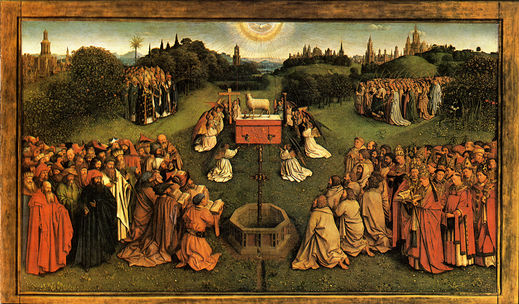
Interestingly, some of the hot button issues these days — about fracking for natural gas, global warming, oil spills, pesticides in our food and whatnot — are common concerns among younger adults, especially, and Wright starts with some of that in his wonderful book designed to be an invitation to faith, Simply Christian: Why Christianity Makes Sense (HarperOne; $24.99.) Not unlike Lewis’ strategy in Mere Christianity (Lewis has left a mark on Wright), he starts with these universal longings, signals, so to speak, of transcendence. For Lewis is was a homesickness. For Wright, these deep down longings are colored by our contemporary anxiety about the nature of our times, after 9-11, amidst family breakdown, sexual confusion, terrorism, economic collapse, and, yes, global warming. He imagines the whole world put “to rights” (as the British say it) and invites seekers to bring their ecological fears to God, realizing that the Bible story which promises restoration of the renewed creation is, in fact, the basis for (even) environmental hope. That story of simple Christianity, properly understood by tracing the trajectory of the promises to Abraham, “makes sense” of our lives, our times, our destiny.
His Surprised by Hope: Rethinking Heaven, The Resurrection, and The Mission of the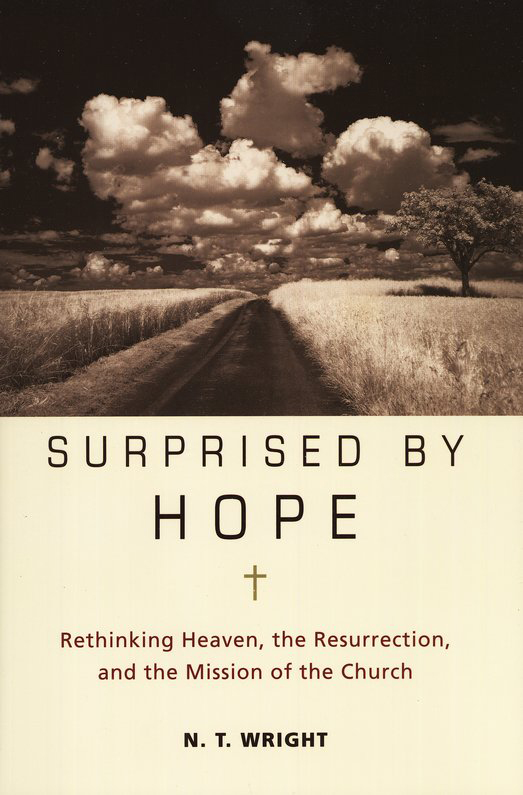 Church (HarperOne; $24.99) gets at this same thing, too, that Christ’s redemptive work isn’t primarily to get our souls to go to heaven, but to bring together heaven and earth (as the Christmas carol puts it.) Joy to the World, indeed! Yes, reading the Bible as Wright teaches us to keeps us Christ-focused, glorying in the cross and the mercy it shows, but doesn’t fixate only on that: it moves onward as the Bible does, pushing us into mission, service, restoration, renewal, reformation. Getting the end of the story right can really help us get our vision of discipleship and life’s very meaning right. This book is very, very important, and at the heart of the whole project of N.T. W.
Church (HarperOne; $24.99) gets at this same thing, too, that Christ’s redemptive work isn’t primarily to get our souls to go to heaven, but to bring together heaven and earth (as the Christmas carol puts it.) Joy to the World, indeed! Yes, reading the Bible as Wright teaches us to keeps us Christ-focused, glorying in the cross and the mercy it shows, but doesn’t fixate only on that: it moves onward as the Bible does, pushing us into mission, service, restoration, renewal, reformation. Getting the end of the story right can really help us get our vision of discipleship and life’s very meaning right. This book is very, very important, and at the heart of the whole project of N.T. W.
Q Founder Gabe Lyons, you may recall, has a recent book about the younger generation of post-evangelicals who want to make a difference in the world, grounded as they are in this multi-chapter, one Biblical story, of God in Christ redeeming creation. He says those who capture that vision are “restorers.” The book is called The Next Christians and it just came out in a new paperback edition (Multnomah; $14.99.) It strikes me as rather Wrightian. This new generation gets it, leaving culture wars behind, wanting to be creators and contributors, not just critics. They want to be people of hope.
What a surprise it can be —hope! 

So N.T. Wright, Bible scholar and pastor, helps us get at all that, our public duties and our daily devotion, the way Biblical faith sets us into the world, for the sake of the world, calling us to a Christ-centered life, full for hope for this being-redeemed creation. (Ahh, I think of Schaeffer’s famous line in the 70s about “substantial healing” (from True Spirituality, still in print today!) which was an audacious sort of hope that we can be used by God to bring some real change to this hurting world. This isn’t what the social gospel theologians said in the early 1900s, and it isn’t the pushy right-wing triumphalism of the dominionists, as some call them. It is just a huge and detailed explication, full of balance and nuance, it seems to me, of God’s promises of renewal and of the command by Jesus to earnestly pray for “Thy Kingdom come, on Earth…”
Dr. Wright helps remind us that this earthy and multi-faceted way of describing the faith (which I am only paraphrasing and summarizing) is, indeed, the best, most Biblically-faithful, interpretation of Christian belief and living. It is a version of faith and discipleship that is deeply traditional and yet revolutionary; an approach that is timeless and so very timely; a way to lean into the faith that is orthodox and catholic and yet not stuffy or denominational. It rejects the way the liberal faith traditions tend to erode orthodox thinking (you may know Ross Douthart’s new book called Bad Religion) and the way conservative faith traditions accommodate themselves to the social status quo sometimes because they think we are all going to be raptured away soon anyway. Neither the progressives nor the traditionalists, in his view, have the wherewithal to turn around the crisis of contemporary faith. A third, fresh way is needed. Or at least I think so.
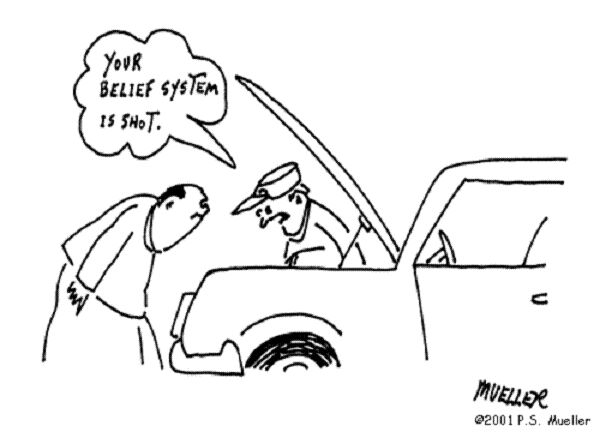
Some of his best admirers even, have wondered if he has overstated things just a bit. See, for instance, James K.A. Smith’s brief musings (“Kings, Creeds, and Canons“) about a Wright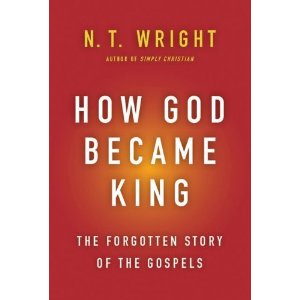 lecture (presented at Calvin College a few months back, you can watch it here) that was based on Wright’s new book, How God Became King: The Forgotten Story of the Gospels (HarperOne; $25.99.) In a rare move, Tom delightfully replied at the blo
lecture (presented at Calvin College a few months back, you can watch it here) that was based on Wright’s new book, How God Became King: The Forgotten Story of the Gospels (HarperOne; $25.99.) In a rare move, Tom delightfully replied at the blo
g comment thread, trying to explain why Jamie’s concern wasn’t appropriate. After a few more comments, Tom chimed in again, trying to put his own perspective “to rights.” It is a good exchange, among friends, and his kind reply is very much worth reading, off the cuff as it may be. Anyway, Wright is mixing it up in various quarters, bringing all kinds of folks into conversation. It may be an overstatement that the Kingdom has been “forgotten” (or maybe it is a subtitle marketing ploy set by the publisher) but his documentation of how those in the mainline churches and the evangelical churches have too often failed at reading the gospels aright is pretty darn compelling, and pretty darn important. I think he’s right on!
I have observed that many love his well-written and clear-headed books in part because of this exciting “third way” forged above and beyond the tired dichotomy between liberals and conservatives, contemplatives and reformers, between modernists and postmodernists, between ecumenicals and evangelicals. Also, there is this energetic passion, rooted in good scholarship, that appeals to very many who want something other than the chattty pablum so common in contemporary religious publishing. If there a writer and leader out there who is pointing us in the right direction, who seems to be saying ever so eloquently what we’ve been trying to say for decades, it is this former Bishop of Durham. We hope our friends and fans follow his work, collect his books, spread the word about his perspective, and thoughtfully engage his call to this sort of faithful Christian living in these days. If you find you disagree with some parts of some books, welcome to the club. Let’s not get in a snit about this, but take what is most helpful, and refine whatever needs refining. He is too important and too right about too much to dismiss or ignore. I know that I, for one, have much to learn, and want to receive his important contribution.
At the risk of redundancy, allow me to say it another way. As we’ve explained, Wright is a world class academic with a heart for the church, grounded in British evangelicalism, who is in conversation with the world-wide church, Anglican and otherwise. He was a delegate to the World Council of Churches, once, which he wrote about in an early book that was recently re-issued, Small Faith, Great God (IVP; $18.00.) He is a Bible scholar who sees the central, unifying role of Christ in the whole of Scriptures, and sees the announcement and establishment of the reign of God as the heart of His gospel. He stands on the rock of Christ, as revealed in the Bible, and does so in innovative and exciting ways, inviting us all to consider how our various church and theological traditions have obscured the real role of Jesus, and the nature of the gospels, and the implications of the inauguration of the Kingdom.
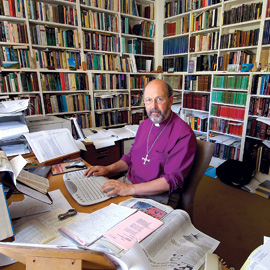 There is no doubt that he is, indeed, an important scholar who has done the heavy lifting in studying historical documents most of us have never even heard of! He writes about the historical details of second Temple Judaism, for instance, or the nuances of the relationship of law and gospel at the end of Romans, or the ways in which Greek words about body and soul are mistranslated often as people read Corinthians, or ways words like “righteousness” from 8th century Isaiah or 19th century theologians may be quite different. His prayerful study is daily done in the Hebrew and Greek. He reads classic stuff–from Josephus to Ben F. Meyer, say—and is in routine conversation with other scholars, like, just for instance, Kenneth Bailey and Richard Hays. He debates those who mock or deconstruct the resurrection, takes on the likes of John Piper in complex discussions about the details of salvation and justification, and yet rarely gets stuck in in-house, obscure arcania with those who want to argue all day without truly serving the church or the world. He wants us to serve the church and the world. You can see why we appreciate him so, and why his work gives us encouragement to keep on trying to sell books as we do. With authors like this, doing books like this, we have to keep going! God’s Kingdom may be advanced because of what God does though folks reading seriously these books. We believe that. Reading matters. I think Tom might like our phrase, “read for the Kingdom!”
There is no doubt that he is, indeed, an important scholar who has done the heavy lifting in studying historical documents most of us have never even heard of! He writes about the historical details of second Temple Judaism, for instance, or the nuances of the relationship of law and gospel at the end of Romans, or the ways in which Greek words about body and soul are mistranslated often as people read Corinthians, or ways words like “righteousness” from 8th century Isaiah or 19th century theologians may be quite different. His prayerful study is daily done in the Hebrew and Greek. He reads classic stuff–from Josephus to Ben F. Meyer, say—and is in routine conversation with other scholars, like, just for instance, Kenneth Bailey and Richard Hays. He debates those who mock or deconstruct the resurrection, takes on the likes of John Piper in complex discussions about the details of salvation and justification, and yet rarely gets stuck in in-house, obscure arcania with those who want to argue all day without truly serving the church or the world. He wants us to serve the church and the world. You can see why we appreciate him so, and why his work gives us encouragement to keep on trying to sell books as we do. With authors like this, doing books like this, we have to keep going! God’s Kingdom may be advanced because of what God does though folks reading seriously these books. We believe that. Reading matters. I think Tom might like our phrase, “read for the Kingdom!”
Well, that’s my windy overview. One more little part we like to share.
We carried the very first book he published in the states, years ago, before he was famous. Soon enough, we realized one of my good friends, an author whose books have been influential in my life, had become friends with N.T. (his friends call him Tom) when they both were at McGill University in Canada in the 1980s. You may know that person is Brian Walsh.
As Brian tells the story in the preface to his own Colossians Remixed: Subverting the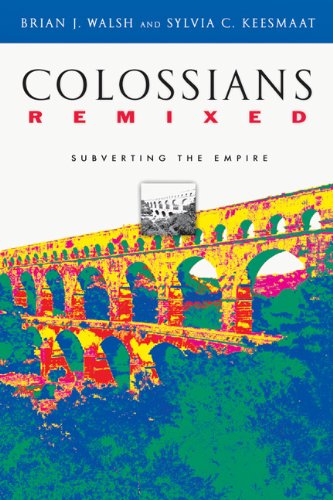 Empire (IVP; $23.00) he asked Tom tough questions week by week about the application of Biblical exegesis as Wright was writing the popular Colossians and Philemon commentary for the Tyndale New Testament Commentaries of the Bible. Tom rather reasonably insisted that the political and cultural questions about application didn’t quite belong in a standard commentary like the Tyndale one he was writing and challenged Walsh to write his own radical commentary on Colossians. Which he did, eventually with the able collaboration of his wife, Sylvia. (That Wright and I both have a blurb on the back is one of the great joys of my literary life, such as it is!)
Empire (IVP; $23.00) he asked Tom tough questions week by week about the application of Biblical exegesis as Wright was writing the popular Colossians and Philemon commentary for the Tyndale New Testament Commentaries of the Bible. Tom rather reasonably insisted that the political and cultural questions about application didn’t quite belong in a standard commentary like the Tyndale one he was writing and challenged Walsh to write his own radical commentary on Colossians. Which he did, eventually with the able collaboration of his wife, Sylvia. (That Wright and I both have a blurb on the back is one of the great joys of my literary life, such as it is!)
Brian’s influence on Tom in those years at McGill was considerable, and when Wright in the early 90s did his magisterial first volume of the projected five volume “Christian Origins and the Question of God” series, The New Testament and the People of God, he drew on Walsh’s worldview questions, his formulation about the unfolding five act gospel story, and dedicated the book to him. Quite an honor for Brian, and a notable hint at their relationship. Any of us who followed Brian’s work in those years (Transforming Vision, Subversive Christianity, and eventually Truth is Stranger Than it Used to Be) saw connections.
Wright became one of the most recognizable serious scholars of religion on the planet, an occasional thorn in the side of both liberals and conservatives, a scholar who worked in the academic guilds and served the church. When he became Bishop in the Church of England in the early 2000’s his fame was secure, and his name a household one among thoughtful Biblical scholars and those who watch the life of the global church. Agree with him or not on all details, his publishing career is imminent, his work greatly honored. He is given accolades even by those with serious disagreements.


I might as well tell another Walsh story, a bit I’ve written about before. The last time I was with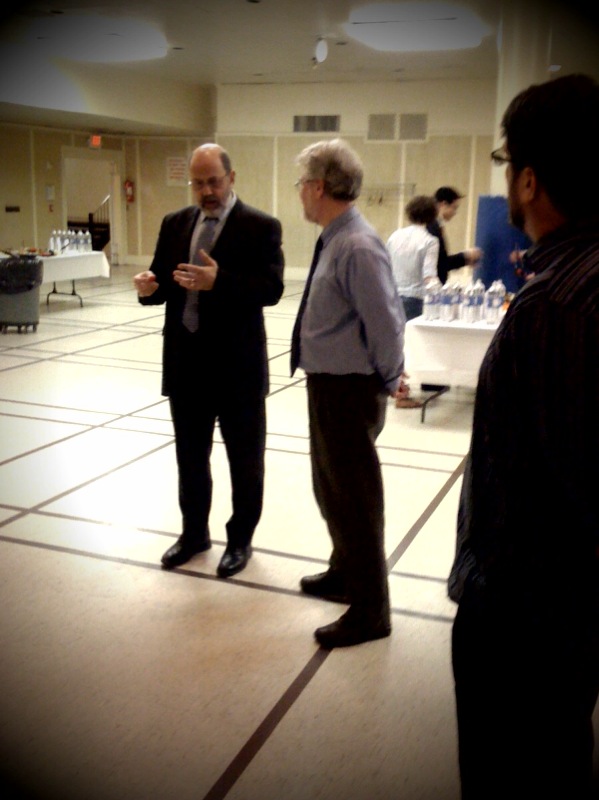 N.T. Wright (selling books for a lecture he gave on character formation, based on the splendid After You Believe, with Redeemer Presbyterian Church in New York City) he had just co
N.T. Wright (selling books for a lecture he gave on character formation, based on the splendid After You Believe, with Redeemer Presbyterian Church in New York City) he had just co
me back from a several day forum on his work held at Wheaton College. We had a little chat about what he had just experienced with our mutual friends Sylvia Keesmaat. Sykvia got her PhD under Wright, and is footnoted in a few of his books, and participated in his installation when he became Canon Theologian at Westminster Abbey, along with her husband, Brian Walsh.
They were on a panel offering (friendly) critique of Wright at this several day event. Their main contribution was two fold: firstly, they asked, first in a playful way, and then in an almost brusk manner, if any of this detailed Biblical study really mattered to anyone outside a small circle of interested friends? (They opened their talk with a friend playing the old Phil Ochs song about this exact matter — does those whose lives are deeply hurting ever get noticed? Do we care about others, or just our own agendas and interests? Does anybody else care about this conversation?) They listed gross examples of poverty and injustice, quoted Tom’s own description of the Biblical demand for cancellation of third world debt, and then wondered how our contemporary economic system, and our nearly numb response to its dysfunctions and idolatries, does or doesn’t get adequate attention from Wright’s theological reflection. It is what Brian calls “the ‘so-what?’ question.”
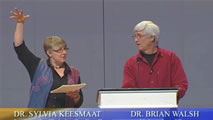 They complimented Wright for his call to societal renewal and for his work doing Kingdom theology that generated a commitment to mercy and justice. They cited some pretty dramatic lines from Wright (like a passionate speech he gave in response to the Queen’s speech about economics in the House of Lords) and wondered if he was taking advantage of the “time” that is so ripe as the Western story collapses. Is there enough prophetic critique and prophetic hope in Wright’s work? Is he pressing that enough? Is there energy for action at the heart of his otherwise excellent work? It was a tough question, perhaps a bit awkward to ask publicly, but they are good friends. It wasn’t a prophetic stunt, it was a pastoral question: how does your work, Tom, doing good exegesis and detailed historical research and clever re-articulation of the nature of the gospel, make a difference, really?
They complimented Wright for his call to societal renewal and for his work doing Kingdom theology that generated a commitment to mercy and justice. They cited some pretty dramatic lines from Wright (like a passionate speech he gave in response to the Queen’s speech about economics in the House of Lords) and wondered if he was taking advantage of the “time” that is so ripe as the Western story collapses. Is there enough prophetic critique and prophetic hope in Wright’s work? Is he pressing that enough? Is there energy for action at the heart of his otherwise excellent work? It was a tough question, perhaps a bit awkward to ask publicly, but they are good friends. It wasn’t a prophetic stunt, it was a pastoral question: how does your work, Tom, doing good exegesis and detailed historical research and clever re-articulation of the nature of the gospel, make a difference, really?
Secondly, Walsh & Keesmaat offer some striking observations about Wright’s reading of the prophetic role of Jesus, in his important Jesus and the Victory of God, particularly. Then they study some of the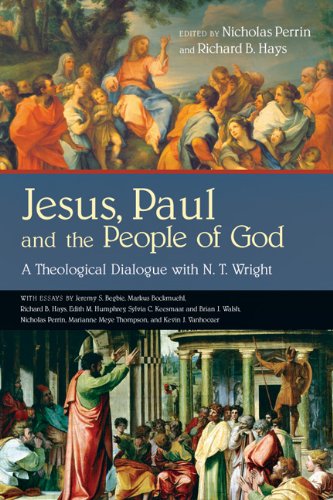 parables. They go back and forth exploring Sylvia’s breathtakingly insightful reading of one of the most famous economic parables. These readings reminds us of the economic injustice in Jesus’ day, and points to Jesus’ demand for covenantal justice. 

You can find that remarkable exchange in Jesus, Paul, and the People of God: A Theological Dialogue with N.T. Wright edited by Nicholas Perrin and Richard B. Hays (IVP; $24.00.) and, importantly, includes N.T. Wright’s response. Their presentation about bearing fruit for justice, feisty as it was, is
parables. They go back and forth exploring Sylvia’s breathtakingly insightful reading of one of the most famous economic parables. These readings reminds us of the economic injustice in Jesus’ day, and points to Jesus’ demand for covenantal justice. 

You can find that remarkable exchange in Jesus, Paul, and the People of God: A Theological Dialogue with N.T. Wright edited by Nicholas Perrin and Richard B. Hays (IVP; $24.00.) and, importantly, includes N.T. Wright’s response. Their presentation about bearing fruit for justice, feisty as it was, is
literally worth the price of the book, and most of the others are
stellar as well.
You can watch the whole exciting presentation here. Sylvia knows the Scriptures very well, as does Brian, and they make a persuasive case that Tom’s own views about global injustice would be stronger if he, in fact, heard the economic teaching of the Bible, which he oddly misses (or so they say.) Click another place at this website to find Tom’s own reply.
This is the sort of generative, kind, open-minded and very candid exchange that we think is great. Most of the chapters in this great book are very useful, even if it may take you a while to work through some of it. Each of the panelists are specialists in their own right, and their evaluations of Wright’s words are illuminating.
Three cheers for Wright’s willingness to allow himself to be the subject of criticism and conversation.
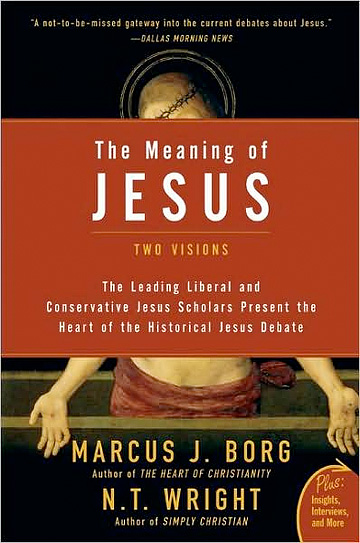 Wright has more famously co-written a book with Marcus Borg, a back-and-forth argument about the historicity of Jesus, Christ’s own sense of calling, the reliability of the gospel accounts, and the character of the resurrection. Borg, as you may know, disagrees with the typical views of these matters, so it is a serious debate. It is in paperback and is called The Meaning of Jesus: Two Visions (HarperOne; $15.99.) Wright also co-wrote and edited a book with Dom Crossan, called The Resurrection of Jesus: John Dominic Crossan and N.T Wright in Dialogue (Fortress; $19.00) which includes some chapters by other participants, too. Crossan is another progressive scholar who teaches that the physical resurrection didn’t happen and that the gospel accounts are not reliable testimonies of what actually happened, but more like parables. Crossan has a view somewhat like Borg’s, and then some…
Wright has more famously co-written a book with Marcus Borg, a back-and-forth argument about the historicity of Jesus, Christ’s own sense of calling, the reliability of the gospel accounts, and the character of the resurrection. Borg, as you may know, disagrees with the typical views of these matters, so it is a serious debate. It is in paperback and is called The Meaning of Jesus: Two Visions (HarperOne; $15.99.) Wright also co-wrote and edited a book with Dom Crossan, called The Resurrection of Jesus: John Dominic Crossan and N.T Wright in Dialogue (Fortress; $19.00) which includes some chapters by other participants, too. Crossan is another progressive scholar who teaches that the physical resurrection didn’t happen and that the gospel accounts are not reliable testimonies of what actually happened, but more like parables. Crossan has a view somewhat like Borg’s, and then some…
If you haven’t heard about this large debate about the historical Jesus, the Meaning of Jesus one by Borg & Wright is excellent to start with. For a wider view, consider The Historical Jesus: Five Views edited by James K. Beilby (IVP Academic; $25.00.) It isn’t every day you see a book with authors as diverse as Crossan, James Dunn, Darrell Bock and more. Wright isn’t in this one, but it is a good way to see the full lay of the land.
Those of us with historically orthodox, traditional views of the reliability of the classic accounts are glad that a spokesperson as able as Wright is friends with folks like Borg & Crossan, even though they have considerable disagreements.
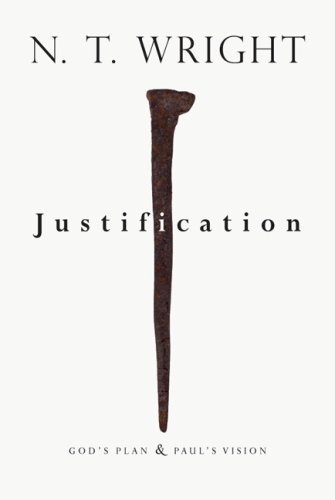 Among more conservative writers who have crossed swords with Wright, a book-length evaluation of his views of Paul and justification was written by the passionate Baptist pastor, John Piper called The Future of Justification: A Response to N.T. Wright (Crossway; $17.99) and it is well worth reading (we commended it when it first came out and continue to stock it.) His critique illustrates the concerns that many in the PCA denomination, particularly, have found troubling (they passed a study report against Wright at their General Assembly a few years ago.) Wright’s response to Piper’s book is called Justification: God’s Plan and Paul’s Vision, published by IVP ($25.00.) The first half is mostly a reply to Piper’s critique, and the second half is Wright’s exegesis and explanation of every key verse in the New Testament that deals with the nature of justification. It is very, very informative, even if you don’t buy all of his unique take on things.
Among more conservative writers who have crossed swords with Wright, a book-length evaluation of his views of Paul and justification was written by the passionate Baptist pastor, John Piper called The Future of Justification: A Response to N.T. Wright (Crossway; $17.99) and it is well worth reading (we commended it when it first came out and continue to stock it.) His critique illustrates the concerns that many in the PCA denomination, particularly, have found troubling (they passed a study report against Wright at their General Assembly a few years ago.) Wright’s response to Piper’s book is called Justification: God’s Plan and Paul’s Vision, published by IVP ($25.00.) The first half is mostly a reply to Piper’s critique, and the second half is Wright’s exegesis and explanation of every key verse in the New Testament that deals with the nature of justification. It is very, very informative, even if you don’t buy all of his unique take on things.
By the way, if you can’t imagine what the fuss is about, read them and think it though.
Here is an excellent, brief interview by Trevin Wax (of the Gospel Coalition) who asks very basic questions of Wright and gives him the chance to summarize his take on the debate with Piper.
Perhaps you could consider this “five views” anthology, which includes some very helpful listening to each other, as each author replies to the others, and some fairly strong rebukes: Justification: Five Views edited by James Beilby (IVP Academic; $25.00.)
Another book I am fond of is a generous synthesis of many different accounts of how the atonement works, created nicely by Scot McKnight. It is called A Community of Atonement (Abingdon; $18.00) and is very interesting. There are a lot of books like this, and they bear mentioning now, as this is in some ways parallel to Tom’s work; it comes with the territory of Wright being linked to what some call “the new Perspective on Paul.” We have quite a few resources on this topic, and hope you take time at some point in your life to dig deeper into this central doctrine of the gospel.
Some “new perspective” thinkers are a bit more radical, while Wright is perhaps a bit more traditional, forging a middle way between traditional (evangelical, Lutheran or Reformed views) and “new perspective” or “nonviolent atonement” theories. You can see one powerful and important example of his thinking about the cross in a left-of-center collection, a brilliant and thick anthology, again, that we carry and recommend. See Wright’s chapter called “The Reasons for Christ’s Crucifixion” in Stricken by God? Nonviolent Identification and the Victory of Christ edited by Brad Jersak and Michael Hardin (Eerdmans; $32.00.)


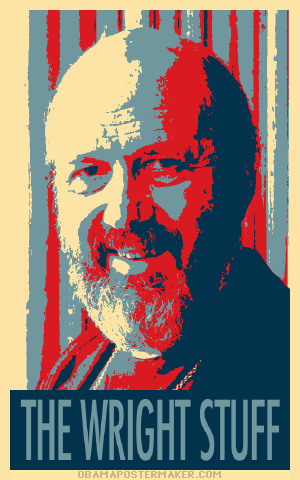 Well, I’ve said that Wright captures, and deepens for us, a lot of what we’ve long tried to articulate, and he does it with graciousness and eloquence, even has he defends and clarifies his views in dialogue with others across the spectrum of thinking found through the range of the church. I, frankly, am a bit less interested in the details of the new perspective debate, and celebrate his singular work on the gospels, and this Kingdom vision he brings to our reading of the whole Biblical canon. It is one reason I am so excited about the two latest books, on Jesus and on the Kingdom. I’m glad that he does this by seeing both the big picture of the arc of Scripture and a close, informed reading of specific texts. And, yes, he reminds us (to put it terribly simply, to “read Paul in light of Jesus, not read Jesus in light of Paul.” Or something like that.)
Well, I’ve said that Wright captures, and deepens for us, a lot of what we’ve long tried to articulate, and he does it with graciousness and eloquence, even has he defends and clarifies his views in dialogue with others across the spectrum of thinking found through the range of the church. I, frankly, am a bit less interested in the details of the new perspective debate, and celebrate his singular work on the gospels, and this Kingdom vision he brings to our reading of the whole Biblical canon. It is one reason I am so excited about the two latest books, on Jesus and on the Kingdom. I’m glad that he does this by seeing both the big picture of the arc of Scripture and a close, informed reading of specific texts. And, yes, he reminds us (to put it terribly simply, to “read Paul in light of Jesus, not read Jesus in light of Paul.” Or something like that.)
And I like a lot how he always reminds us to grapple with the deepest “below the surface” issues, which often include our creepy inclination to Gnosticism and, most often, some uncritical accommodation with the beliefs of post-Enlightenment rationalism. He explains what he means by that sometimes, and we simply have to realize that many evangelicals and most liberals are both significantly living in the shadow of these pagan ideologies of faith in science, progress, autonomous reason, personalized views of religious truth, leading to crass secularization and the like.
Well, he’s a good writer, and I think a dear chap. I enjoy listening to him immensely and have appreciated being around him a time or two. I hope you’ve checked out a few of his many free lectures on line or watched some of the nice v
ideo clips of him. Skip the cranky one’s you’ll find, and give him a fair listen.
Here is a nice glimpse of Wright’s interest in reaching a wide audience, and a bit about his own thinking as an author. In is marvelous book Simply Jesus he pens a lovely foreword, a foreword that got me choked up a bit, even, as he talked about losing his father:
This is the first book I have written since the death of my beloved father, at the age of ninety-one. Having read little or no theology or biblical scholarship until his mid-sixties, when I started writing, he then read everything I wrote within days of its publication and frequently telephoned me to tell me what he thought about it. I cherish some of his comments…When my big book on the resurrection came out, he read it, all 700 pages, in three days, commenting that he really started to enjoy it after about page 600. Presumably, with the end in sight, he was starting to experience hope as well as reading about it. Particularly with my popular writings, I now realize that he was always part of the “target audience” of which I was subconsciously aware. Writing a book like this feels different now that he’s not there to read it. In any case, though I hope he learned a few things from me, this book—particularly its concluding chapter—hints at some of the many things I learned from him. As I grieve his passing, I dedicate this book to his memory with gratitude, love, and yes, hope.
BOOKS (AND DVDs)
THE MOST SCHOLARLY
The Climax of the Covenant: Christ and the Law in Pauline Theology (Fortress) $29.00 This is really, really important, an early scholarly work (written in the early 90s) that should be considered by anyone interested in serious Pauline studies. A foundational book for how Wright will later explore Paul’s work in relationship to the saving work and Kingdom-bringing of Jesus. Wright PhD work thesis, by the way, focused largely on the Davidic vision of Messiah, appropriated by Jesus, and how that effected Paul. So he started out with a big picture view, but focusing on Pauline studies.
The New Testament and the People of God (Fortress) $38.00 Hefty, audacious, serious, laying out his methodology for studying the worldview of various factions within first century Judaism to understand the nature of God’s redemptive work in Christ. Outstanding.
Jesus and the Victory of God (Fortress) $41.00 This large book weighs nearly 21/4 pounds, and has more meat per page than nearly any book I’ve ever read. It is magisterial, provocative, and has generated several other books written in its honor and to refute some of its central claims. Truly a remarkable, historic contribution.
The Resurrection of the Son of God (Fortress) $45.00 Few would not agree that this is the most thorough book ever done on the resurrection, nearly 800 pages of amazing history, theology, Biblical interpretation. A tour de force.
Justification: God’s Plan & Paul’s Vision (IVP) $25.00 As I described this above, it is a nearly tedious reply to the attack by John Piper, and then a close reading of every passage in the New Testament that speaks of justification. Actually, it isn’t that academic, just a rather detailed study that many of us haven’t carefully considered. There is more here than most of us realize, so this is intense.
THOSE THAT ARE NOT SCHOLARLY, BUT A BIT DEMANDING
The Challenge of Jesus: Rediscovering Who Jesus Was and Is (IVP) $18.00 This may be the best introduction to his fairly serious work; the three major chapters are essentially summaries of each of the three big ones. These were talks given at an IVCF graduate student and faculty ministry conference, and is excellent. Very highly recommended., and perfect for those who want the basic arguments of his major works, without wading through the tomes. Truth be told: my kind of book!
Paul: In Fresh Perspective (Fortress Press) $20.00 Everybody was talking about “the new Perspective on Paul” and whether this is it or not, I cannot say, but it is a revolutionary look at the genius of this first century church leader, theologian, letter writer and chief evangelist for the Kingdom of God. Christ and Him crucified is what Paul wanted to be known for, but is also known for his radical work in guiding the formation of local Christian communities all over the Mediterranean. See my description below of Wright’s earlier smaller book on Paul to see part of his Pauline project. Very important. (For what it is worth, a bit of this “new perspective” controversy may have to do with how much of evangelical faith about salvation came from the teaching of Luther about Paul’s teaching about grace in light of the Jews, but many believe that Luther simply got that wrong. First century Jewish leaders did not teach salvation by works; that was more Luther’s battle with medieval Catholicism. Paul’s heartfelt passion was to unite Gentiles into the church which was, in those days, mostly Jewish. The middle of Romans—salvation through faith alone–leads to the ends of Romans, the great news that in Christ we are reconciled to each other, beyond ethnic lines. This is high theology explored carefully, leading to revolutionary social realities.
Evil and the Justice of God (IVP) $18.00 This book is, if I may say such a thing, really fantastic and truly inspiring. No serious theologian can write in these post-holocaust days of genocide and global warming and ethnic warfare without addressing the horror of the fall. There is an edition that comes with a DVD ($28.00) and the DVD is amazingly good.
Surprised by Hope: Rethinking Heaven, The Resurrection, and The Mission of the Church (HarperOne) $24.99 This really is one of my favorites, and a key book in his work. It is not too academic, but it is thorough, and covers all kinds of issues around what we mean by the “resurrection of the body.” If we reject as unbiblical a hard dualism between body and soul (that is, we believe in the resurrection of our bodies along with the whole new Earth which is the creation restored, then, well, what does happen to us when we die? If our final destination is to reign with Christ over the restored creation—the glorious city–then why do we speak of “going to heaven.” And how does a proper view of the life after death effect the mission of the church now, as we witness to the future hope that is beginning now, in Christ. What a serious, good, provocative and rewarding read!
DVD Surprised by Hope: Rethinking Heaven, The Resurrection, and The Mission of the Church (Zondervan) I used this in an adult ed class at our church and folks really like it. It is so very interesting, well produced, nicely done. I couldn’t hardly recommend a resource like this more enthusiastically. You should buy the participants guide, too ($9.99.) Six sessions.
DVD Evil (IVP) $20.00 This is a 50-minute film based on the book mentioned above, drawing on Desmond Tutu and others as they grapple with evil such as the AIDS pandemic to tsunamis to global wars. The first scene starts off with Bishop Wright speaking while walking along a stormy beach, with the Biblical metaphor of chaos powerfully portrayed. Very well done, provocative and interesting, and, finally, hopeful. It could easily be broken up into several sessions. A small discussion guide comes with it.
DVD Resurrection (IVP) $20.00 Again, I am a real van of these professionally made, truly interesting presenta
tions; like the one described above it is a 50-minute film, shot on location in Rome, Greece, and the British Isles. They explain why this historic Christian creedal statement is so very important, and what the implications are of a robust view of the full resurrection of Christ. Not just for Easter, I think this is urgent, essential, and not to be missed. What do you use to learn about, and to teach others about the resurrection? With impeccable, clear teaching, he explores themes studied in The Resurrection of the Son of God.


After You Believe: Why Christian Character Matters (HarperOne) $15.99 This small paperback is excellent, but a bit stretching, perhaps, for those whose reading about Christian character is simple. This looks at how virtue was seen in the Greco-Roman world, how Christian transformation of character is like, and considerably unlike, other visions of ethics known before. The title says it all, and it is a very important little book.
Scripture and the Authority of God (HarperOne) $25.99 So how do we view the Bible? What is the role of the Bible? In what way does it, as the revelation of God, compel us? Is there a way to get beyond the standard approaches that either are too wooden or too loose? Very interesting, and if it isn’t the final word on this complicated matter, it is a fine contribution to our understanding of God’s Word and its role in our lives. This is, by the way, a handsome hardback, expanded from an earlier paperback called The Final Word.

START HERE: THOUGHTFUL BUT BASIC LEVEL BOOKS, DESIGNED FOR THE EDUCATED LAYPERSON.
 Simply Christian: Why Christianity Makes Sense (HarperOne) $24.99 I’ve discussed this at great length before and think the world of it. The first part is a rumination on the deepest concerns and anxieties folks have nowadays (about war, poverty, sexuality and such.) The middle part is essentially an overview of the grand Biblical narrative. The final part wonders out loud: what if this story answers those questions? Could this Biblical vision provide the best way to understand and work on these large areas of brokenness and dysfunction. The books ends with a call to faith, and some practical stuff about church, eucharist, worship and fellowship. Sort of a Mere Christianity for today.
Simply Christian: Why Christianity Makes Sense (HarperOne) $24.99 I’ve discussed this at great length before and think the world of it. The first part is a rumination on the deepest concerns and anxieties folks have nowadays (about war, poverty, sexuality and such.) The middle part is essentially an overview of the grand Biblical narrative. The final part wonders out loud: what if this story answers those questions? Could this Biblical vision provide the best way to understand and work on these large areas of brokenness and dysfunction. The books ends with a call to faith, and some practical stuff about church, eucharist, worship and fellowship. Sort of a Mere Christianity for today.
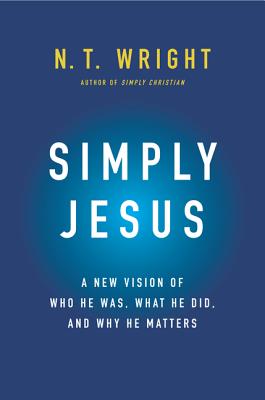 Simply Jesus: A New Vision of Who He Was, What He Did and Why He Matters (HarperOne) $24.99 I hope you saw the video clip we offered in the previous post, but you will see there that Wright is passionate about Christ, seriously eager to have folks examine his teachings and see how they can transform us, our churches, and our world. What a great, great introduction to the nature of Jesus and who is claimed to be and what he taught us to do. This is a fabulously interesting, fresh and convincing view of Christ and faith and how it matters. I know you want to be touched by His grace and learn to more faithfuly follow Him. This will help.
Simply Jesus: A New Vision of Who He Was, What He Did and Why He Matters (HarperOne) $24.99 I hope you saw the video clip we offered in the previous post, but you will see there that Wright is passionate about Christ, seriously eager to have folks examine his teachings and see how they can transform us, our churches, and our world. What a great, great introduction to the nature of Jesus and who is claimed to be and what he taught us to do. This is a fabulously interesting, fresh and convincing view of Christ and faith and how it matters. I know you want to be touched by His grace and learn to more faithfuly follow Him. This will help.
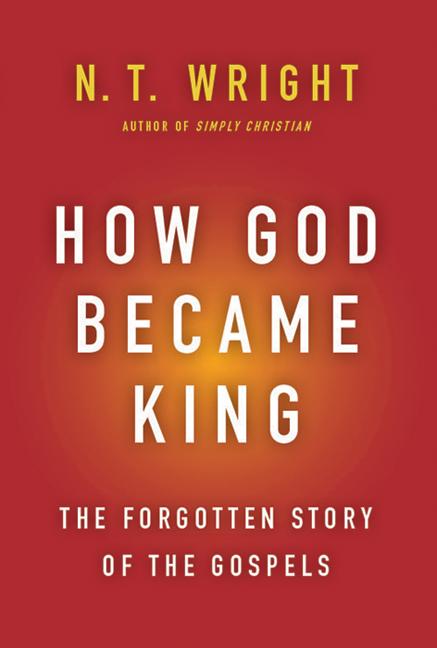 How God Became King: The Forgotten Story of the Gospels (HarperOne) $25.99 There are a dozen reasons why we have missed the central heart of the gospel narratives, and how this announcement and teaching about the Kingdom coming is central to the entire Biblical story. But there it is, heart and soul, front and center. Wright takes our blinders off, invites us to consider why we’ve fudged on this stuff, and how to regain and truly Biblical picture of the nature of God and the saving work of Christ. Christ does, in fact, rule the world, as the carol says. Let Heaven and Nature Sing! A must-read.
How God Became King: The Forgotten Story of the Gospels (HarperOne) $25.99 There are a dozen reasons why we have missed the central heart of the gospel narratives, and how this announcement and teaching about the Kingdom coming is central to the entire Biblical story. But there it is, heart and soul, front and center. Wright takes our blinders off, invites us to consider why we’ve fudged on this stuff, and how to regain and truly Biblical picture of the nature of God and the saving work of Christ. Christ does, in fact, rule the world, as the carol says. Let Heaven and Nature Sing! A must-read.


BIBLE COMMENTARIES
 For Everyone series Westminster/John Knox) 18 volumes; $16.00 each.
For Everyone series Westminster/John Knox) 18 volumes; $16.00 each.
These are perhaps like the old Barclay series, readable, jam-packed for of good information, interesting background insight, and a helpful illustration, helpful to snitch if one is a teacher or preacher. A few of his readings are truly remarkable, powerfully helpful. Others are standard fare, nicely done. What a fine and useful set, full of Wright-isms and that broad picture of seeing the New Testament developing among the first century followers of the Jewish Messiah, King Jesus. Impressive, basic, helpful. Buy the whole set of all 18 and we’ll work up a great deal.
The Kingdom New Testament: A Contemporary Translation (HarperOne) $25.99 As the best commentators usually do, Wright translates the text from the Greek line by line as he walks us through each book of his “For Everyone” commentaries. He isn’t fully convinced the NRSV or the NIV get the words quite right, so with his expert knowledge and Kingdom vision, he re-translated the whole NT for each commentary. Voila, he ended up with a whole New Testament. Very neat.
best commentators usually do, Wright translates the text from the Greek line by line as he walks us through each book of his “For Everyone” commentaries. He isn’t fully convinced the NRSV or the NIV get the words quite right, so with his expert knowledge and Kingdom vision, he re-translated the whole NT for each commentary. Voila, he ended up with a whole New Testament. Very neat.
INSPIRATIONAL, INSIGHTFUL, HIS MOST ACCESSIBLE.
Following Jesus: Biblical Reflections on Discipleship (Eerdmans) $14.00 I can’t tell you how much I love this book, how rich and insightful it is as it places Jesus squarely at the heart of most books of the New Testament. That is, each chapter explores how Jesus is presented by various writers of the NT. Makes a great small group study, good for an adult book club, or could be used to inspire a sermon series of class.
For All God’s Worth: True Worship and the Calling of the Church (Eerdmans) $13.00 I love this for its wonderful first half of short essays or sermons on worship. I love it for its wonderful second half of short essays or sermons on work. That it bring together Sunday liturgy and our week-day service in the world, as two sorts of responding to God in worship is just brilliant. We ought to sell these by the boat-load, and not sure why. Maybe he was ahead of his time. This is a book for today!
What Saint Paul Really Taught: Was Paul of Tarsus Really the Founder of Christianity (Eerdmans) $18.00 Before anybody talked about a “new” perspective on Paul, these short studies served to help us get a good handle on what Paul was about, his church planting and Kingdom preaching and gospel service. Part of the background, I think, is that he is replying to the criticism of Paul that he somehow created a view of Christian faith that wasn’t the same as Jesus’ own view, and superimposed his own systematic theology (and bigotries) on the early church. Wright says we can’t dismiss Paul that easily, and, properly understood, we can see the continuity between Jesus and Paul. Fantastic!
The Lord and His Prayer (Eerdmans) $10.00 What a great littl
e book on the Lord’s prayer. I suppose this was a sermon series. Very nicely done.
Reflecting the Glory: Meditations for Living Christ’s Life in the World (Augsburg) $14.99 I suppose this is to be a Lenten study, but it certainly is perfect for Lent. But it is great anytime! The print is small but get a magnifying glass if you have to: this is one of the best daily devotionals we’ve ever seen. Drawing from various NT texts (and a bit from John) this is a truly tremendous book. Includes 53 entires, each with a short closing prayer, and a discussion guide in the back. Read it and then re-read it. Written when he was Dean of Lichfield in England.
Small Faith–Great God (IVP) $18.00 This was actually Wrights first book, printed in England in the 70s. I loved his introduction when he admitted he has changed a bit since then (duh — of course) but that he feels these messages still hold up, and are soundly helpful today. Very nice, about faith. Risky, strong, stuff, very nicely done.
For All the Saints? Remembering the Christian Departed (Morehouse) $12.00 There aren’t enough good books on this, and it not only illustrates his strong Anglican tradition and his knowledge about history, it makes a strong case that we need liturgies and practices around All Saint’s and All Soul’s Days. Very thoughtful — you can see here some of the pastoral concerns that he explores in greater depth in Surprised by Hope.
The Meal Jesus Gave Us: Understanding Holy Communion (Westminster/John Knox) $13.00 A small, pocket sized paperback offering a rich meditation on the nature of the Eucharistic Last Supper. Very basic, but yet moving, published by the Presbyterian Church (USA). Nice.
DISCOUNT
ANY BOOK BY N.T. WRIGHT
2O% off
FOUR DAYS ONLY. OFFER EXPIRES MAY 9, 2012.
order here
takes you to the secure Hearts & Minds order form page
just tell us what you want
inquire here
if you have questions or need more information
just ask us what you want to know

For those who haven’t heard the backstory, Wright is lecturing Friday at the wonderful Ecumenical Institute of Theology at St. Mary’s Seminary in Baltimore. He’s also their commencement speaker Thursday night (that’s the caliber of place it is!) We have the privilege of serving their event by providing books for sale, Friday afternoon and evening. Since Wright is in the area, our friends at the Ecumenical Institute will bring him here.
We mentioned his Baltimore lectures at facebook and twitter quite some time ago, but didn’t mention it above since there were already at capacity — it’s a sell out crowd!
The EI is doing some great work (we’ve sold books with them there for lectures by Eugene Peterson and Miroslov Volf, too, in the past year.) A few friends have attended classes, working on an advance degree, and loved it. Do check it out, here: http://www.stmarys.edu/ei/.
We are grateful for their support of our little efforts here at the shop.
For those who haven’t heard the backstory, Wright is lecturing Friday at the wonderful Ecumenical Institute of Theology at St. Mary’s Seminary in Baltimore. He’s also their commencement speaker Thursday night (that’s the caliber of place it is!) We have the privilege of serving their event by providing books for sale, Friday afternoon and evening. Since Wright is in the area, our friends at the Ecumenical Institute will bring him here.
We mentioned his Baltimore lectures at facebook and twitter quite some time ago, but didn’t mention it above since there were already at capacity — it’s a sell out crowd!
The EI is doing some great work (we’ve sold books with them there for lectures by Eugene Peterson and Miroslov Volf, too, in the past year.) A few friends have attended classes, working on an advance degree, and loved it. Do check it out, here: http://www.stmarys.edu/ei/.
We are grateful for their support of our little efforts here at the shop.